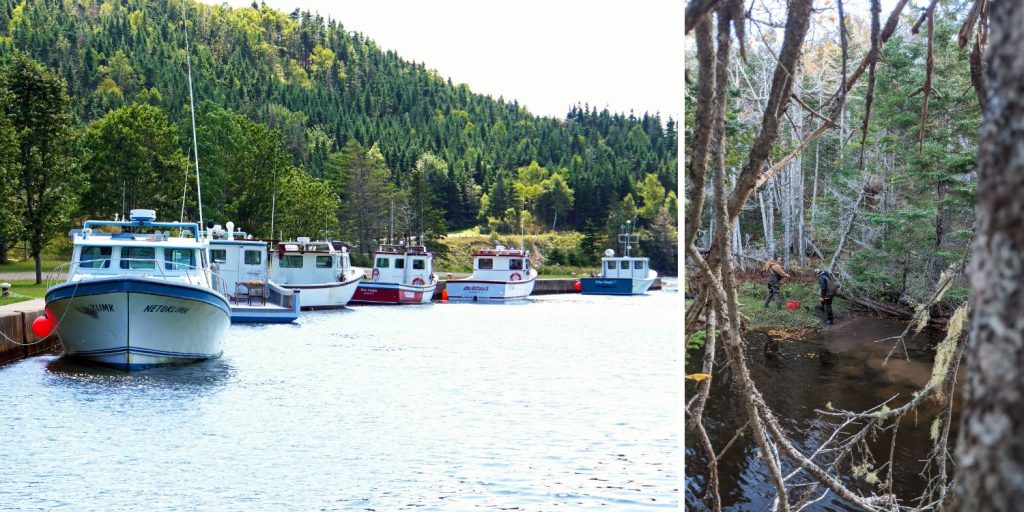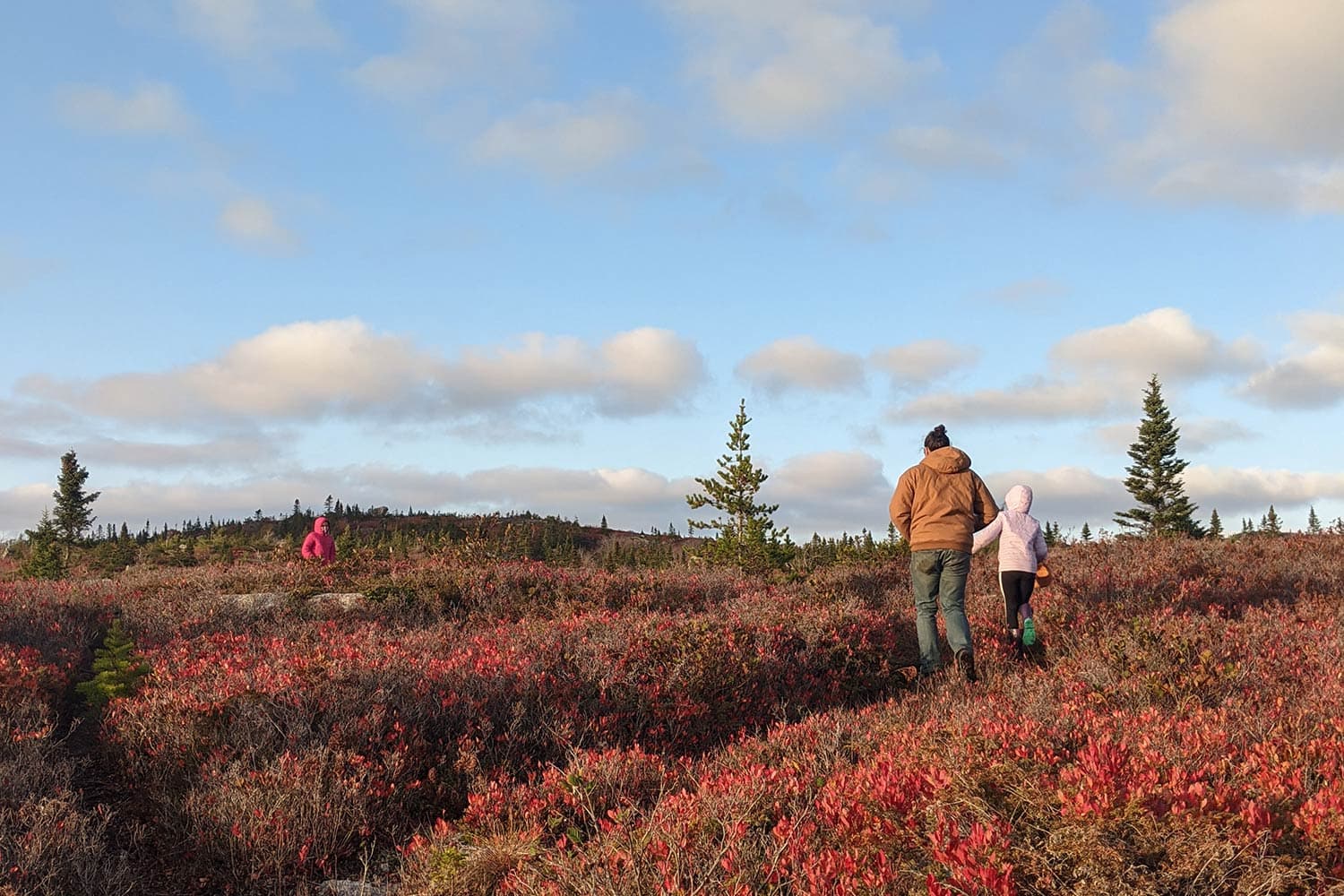Netukulimk: The Mi’kmaq Way of Life
Despite colonial attacks, Indigenous peoples have preserved our principles of living in harmony with the land.
Participants in Reclaiming our Roots’ land-based learning programs picking cranberries in Nova Scotia
When I was a child, my father would tell me awe-inspiring stories about Chief Raoni, the head of the Kayapo people who has led the struggle against the exploitation of their land in Brazil. I was fortunate to meet Chief Raoni when my father and the Innu nation of Québec invited him to speak about Indigenous rights and protecting the boreal forest. One of my fondest memories is of touring Montreal’s Biodôme with him. In the lush and warm tropical rainforest exhibit, he walked right off the path marked for visitors. I assume he felt at home, connected to the forest, even inside a concrete building in the middle of the city.
This moment was one of my earliest teachings. Remembering Chief Raoni’s connection to the land reminds me that we are in an interdependent relationship with Mother Earth, responsible for protecting the gifts we receive from her, and using them in a sustainable way.
This perspective is not unique to a single Indigenous nation, tribe, or even continent. My father is Quechua from Peru. The Quechua philosophy of sumak kawsay — which loosely translates to “good living” — is based on ancestral knowledge and practices. Through sumak kawsay, we, as a community, coexist with the land, preserve our culture and identity, and care for an environment that will provide for us for generations. An example of sumak kawsay is haywarisqa, an offering of natural objects made by farmers before they harvest potatoes, symbolising giving back what they have taken from the Earth. The offering is a gift, charged with intention, love, reciprocity, and reverence, and is usually burned, buried, or released into a river.

Killa Atencio
My mother is Mi’kmaq from Listuguj, Québec, and in our culture there is a parallel value at the centre of everything we do: netukulimk (pronounced neh-DU-guh-limk). Its teachings — that the human and natural worlds are not separate from each other — are sewn into the fabric of Mi’kmaq identity and celebrated. Netukulimk means to have enough, but not more than enough. It teaches us to use natural bounty for ourselves and community sustenance, without wasting and jeopardizing it for the future.
When we would go sweetgrass picking in summer, I was taught to respect the plant and give thanks by offering tobacco to the Earth. We would do our best to not step on many plants as we walked, pick in different areas to not deplete the population, not pull out the root, and only pick what we needed to ensure there would be sweetgrass left for the next season.
Netukulimk means to have enough, but not more than enough.
Prior to European contact, nature and its waterways provided all the necessities of life for the Mi’kmaq. Since contact, we have endured colonization’s attempts to sever our relations to the land and the offerings it provides. The Peace and Friendship Treaty of 1752 — signed by the Mi’kmaq and the British crown — asserts that the Mi’kmaq “shall not be hindered from, but have free liberty of Hunting & Fishing as usual.” But this clause has not been honoured and has often been impeded by bureaucracy. With the creation of reserves in the late 1800s, Mi’kmaq were often relocated far from their traditional hunting and harvesting territories, or without access to waterways. Mi’kmaq people hunting or fishing would sometimes be accused of “poaching” and have their catch seized by the Canadian government’s Indian Agents.
These colonial tactics took a toll on transferring the teachings of netukulimk between generations. But we haven’t let them be forgotten. Reclaiming Our Roots is a Mi’kmaq-led project in Nova Scotia that connects Indigenous youth with meaningful land-based learning and community stewardship, rooted in the principle of netukulimk. One of the group’s activities is trapping beaver for population management. In keeping with netukulimk, they identify how many can be harvested each year, rotate trapping spots, and use every part of their catch by eating and gifting the meat, and using hides, skulls, teeth, and claws for crafts or ceremony.

L: The Peace and Friendship Treaty of 1752 grants Mi’kmaq people “free liberty of Hunting & Fishing as usual,” but this clause has often not been honoured. R: Reclaiming our Roots participants out trapping beaver
Mi’kmaq rights to hunt and fish were upheld by the Supreme Court of Canada in 1985 and 1999. But though the court said we were entitled to earn a “moderate livelihood” from our hunting, gathering, and fishing back in 1999, Canada has never clearly defined what that might look like. Tired of waiting and determined to reaffirm their rights, Mi’kmaq fishers in Digby, NS, began to harvest lobster for sale outside the commercially licensed fishery earlier this fall.
Colonial tactics took a toll on transferring the teachings of netukulimk between generations. But we haven’t let them be forgotten.
When white commercial lobster fishermen responded by harassing, intimidating, and destroying the property of the Indigenous fishers in the name of “conservation,” they completely ignored our treaty rights. They failed to understand that the Mi’kmaq are self-governed by our own laws of conservation and resource management through netukulimk, which has been practiced for thousands of years. And it’s not just an ancient principle: Mi’kmaq communities have implemented fisheries management plans and livelihood fishery principles guided by netukulimk, including regulations like prohibiting the retention of lobsters that are molting, under a certain size, or have eggs attached.
I don’t use the term “natural resources.” It commodifies Mother Earth’s gifts and denies the spiritual connection we have to her. The Earth is not ours, no matter who we are — it belongs to our grandchildren. We are simply stewards. By continuing to practice, relearn, and share the teachings of netukulimk, we partake in honouring our ancestors, ourselves, and the generations to come.
Print Issue: Winter 2021
